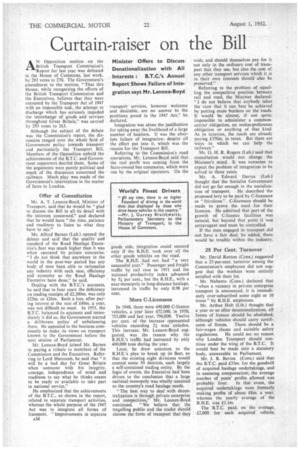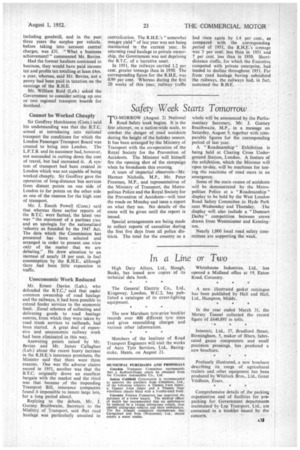Curtain-raiser on the Bill
Page 52

Page 53

If you've noticed an error in this article please click here to report it so we can fix it.
Minister Offers to Discuss Denationalization with All Interests : B.T.C.'s Annual Report Shows Failure of Integration says Mr. Lennox-Boyd
AN Opposition motion on the British Transport Commission's Report for last year was defeated in the House of Commons, last week. by 293 votes to 270. The Government's amendment to the motion, "That this House, while recognizing the efforts of the British Transport Commission and the Executives, believes that they were entrusted by the Transport Act of 1947 with an impossible task, the attempt to discharge which has seriously impeded the interchange of goods and services throughout Great Britain," was carried by 293 votes to 263.
Although the subject of the debate was the Commission's report, the discussion ranged over the whole field of Government policy towards transport and particularly the Transport Bill. Members of the Opposition upheld the achievements of the B.T.C. and Government supporters decried them. Some of the arguments were purely political and much of the discussion concerned the railways. Much play was made of the Government's intervention in the matter of fares in London.
Offer of Consultation
Mr. A. 1'. Lennox-Boyd, Minister of Transport, said that he would be glad to discuss the Bill in all its detail with the interests concerned," and declared that he would have "the time, patience and readiness to listen to what they have to say."
Mr. Alfred Barnes (Lab.) opened the debate and said that the quality and standard of the Road Haulage Executive's fleet was much higher than it was when operated by private enterprise. "I do not think that anywhere in the world in the post-war period has any body of men been able to rationalize any industry with such ease, efficiency and economy as the Road Haulage Executive have done," he said.
Dealing with the B.T.C.'s accounts, he said that in four years the deficiency on trading receipts of £2,200m. was only £25m. or £26m. Such a loss, after paying interest at the rate of £40m. a year, was not difficult to meet. In 1951, the B.T.C. balanced its accounts and immediately it did so, the Government started a deliberate policy of unbalancing them. He appealed to the business community to make its views on transport known to the Government before the next session of Parliament.
Mr. Lennox-Boyd joined Mr. Barnes in paying a tribute to members of the Commission and the Executives. Referring to Lord Hurcomb. he said that "it will be a bad day for Great Britain when someone with his integrity, courage, independence of mind and readiness to say what he thinks ceases to be ready or available to take part in national service."
He emphasized that the achievements of the B.T.C., as shown in the report, related to separate transport activities, whereas the whole purpose of the 1947 Act was to integrate all forms of transport. "Improvements in separate A4 transport services, however welcome and desirable, are no answer to the problems posed in the 1947 Act," he declared.
Integration was alone the justification for taking away the livelihood of a large number of hauliers. It was the absolute failure of integration, despite all the effort put into it, which was the reason for the Transport Bill.
Referring to the Commission's road operations, Mr. Lennox-Boyd said that the real profit was coming from the State-owned bus companies, which were run by the original operators. On the goods side, integration could succeed only if the R.H.E. took over all the other goods vehicles on the road.
The R.H.E. had not had "a very successful year." Passenger and freight traffic by rail rose in 1951 and the national productivity index advanced by 54 Per cent., but the R.H.E., with a near-monopoly in long-distance haulage, increased its traffic by only 0.98 per cent.
More C-Licensees
In 1948, there were 490,000 C-licence vehicles, a year later 672000, in 1950, 733,000 and last year, 796,000. Twelve per cent, of the increase represented vehicles exceeding 24 tons unladen. This increase, Mr. Lennox-Boyd suggested, was the reason why the R.H.E.'s traffic had increased by only 400,000 tons during the year.
Later, he drew attention to the R.H.E.'s plan to break up its fleet, so that the existing eight divisions would control some 50 districts, each largely a self-contained trading entity. By the logic of events, the Executive had been driven to the conclusion that a large national monopoly was wholly unsuited to the country's road haulage needs.
"The best way to deal with decentralization is through private enterprise and competition," Mr. Lennox-Boyd continued. "We believe that the traxelling public and the trader should choose the form of transport that they wish, and should themselves pay for it not only in the ordinary cost of transport that they use, but also the cost of any other transport services which it is in their own interests should also be • preserved." Referring to the problem of equalling the competitive position between rail and road, the Minister declared: "I do not believe that anybody takes the view that it can best be achieved by putting more burdens on the roads. It would be almost, if not quite, impossible to administer a commoncarrier obligation, an undue-preference obligation or anything of that kind. As to taxation, the roads are already paying £350m. in taxes. But there are ways in which we can help the railways."
Mr. G. H. R. Rogers (Lab.) said that consultation would not change the Minister's mind. It was nonsense to expect the problem of integration to be solved in three years.
Mr. A. Edward Davies (Lab.) thought that the Socialist Government did not go far enough in the Socializa tion of transport. He described the proposed levy to be paid by C-licensees as "frivolous." C-licensees should be made to prove the need for their licences. He admitted that part of the growth of C-licence facilities was natural, but beyond that point it was extravagant and must be controlled.
If the men engaged in transport did not have a fair deal, he added, there would he trouble within the industry.
25 Per Cent. Turnover Mr. David Renton (Cons.) suggested that a 25-per-cent. turnover among the Commission's employees. did not suggest that the workers were entirely satisfied with their lot.
Mr. Nabarro (Cons.) declared that when a vacancy in private enterprise transport is announced, it is immediately over-subscribed some eight or 10 times" by R.H.E. employees.
Mr. Arthur Holt (Lib.) thought that a year or so after denationalization, all forms of licence should be abolished, although vehicles should carry eertificates of fitness. There should be a fair-wages clause and suitable safety regulations. He could see no reason why London Transport should continue under the wing of the B.T.C. It would best be made into a statutory body, answerable to Parliament.
Mr. J. R. Bevins (Cons.) said that the B.T.C. paid £33m. for the goodwill of acquired haulage undertakings, and in assessing compensation, the average number of years' profits allowed was probably four. In that event, the acquired undertakings were formerly making profits of about £8m. a year, whereas the yearly average of the R.H.E. was £1,1m.
The B.T.C. paid, on the average, £2,000 for each acquired vehicle,
including goodwill, and in the past three years the surplus per vehicle, before taking into account central charges, was £31. "What a business achievementt " commented Mr. Bevins.
Had the former hauliers continued in business, they would have paid income tax and profits tax totalling at least £4m. a year, whereas, said Mr. Bevins, not a penny had been paid in taxation on the earnings of the R.H.E.
Mr. William Reid (Lab.) asked the Government to consider setting up one or two regional transport boards for Scotland.
Cannot he Worked Cheaply
Sir Geoffrey Hutchinson (Cons.) said his understanding was that the B.T.C. aimed at introducing into national transport the conditions for which the London Passenger Transport Board was created to bring into London. The L.P.T.B. and its successor had, however, not succeeded in cutting down the cost of travel, but had increased it. A system of transport had been created in London which was not capable of being worked cheaply. Sir Geoffrey gave the operation of long-distance bus services from distant points on one side of London to far points on the other side as one of the reasons for the high cost of transport.
Mr. J. Enoch Powell (Cons.) said that whereas three earlier reports of the B.T.C. were factual, the latest one was "the statement of a partisan Case and an apolegia for the nationalized industry as founded by the 1947 Act. The data which the Commission has presented has been selected and arranged in order to present_ one view only of the matter that we are debating." He drew attention to an increase of nearly 18 per cent, in fuel consumption by the R.H.E., although there had been little expansion in traffic.
Uneconomic Work Reduced
Mr. Ernest Davies (Lab.), who defended the B.T.C.,` said that under common ownership of road haulage and the railways, it had been possible to extend feeder services to the economic limit. Zonal schemes of collecting and delivering goods to road haulage centres, from which they were taken by road trunk services to railheads, had been started. A great deal of expensive and uneconomic railway work had been eliminated in this way.
Answering points raised by Mr. Bevins and Mr. James Callaghan (Lab.) about the recent heavy increase in the R.H.E.'s insurance premiums, the Minister said that there were three reasons. One was the adverse claims record in 1951, another was that the B.T.C. originally drove an excellent bargain with the market and the third was that because of the impending Transport Bill, insurance companies found it impossible to insure large lots, for a long period ahead.
Replying to the debate, Mr. J. Gurney Braithwaite, Secretary to the Ministry of Transport, said that road haulage was particularly unsuited to centralization. The R.H.E.'s "somewhat meagre yield" of last year was not being maintained in the current year. In returning road haulage to private ownership, the Government was not depriving the B.T.C. of a lucrative asset.
In 1951, the railways carried 1.2 per cent, greater tonnage than in 1950. The corresponding figure for the R.H.E. was 0.99 per cent. Whereas during the first 20 weeks of this year, railway traffic
had risen again by 1.4 per cent., as compared with the corresponding period of 1951, the R.H.E.'s tonnage was 5 per cent, less than in 1951 and 7 per cent, less than in 1950. Short' distance traffic, for which the Executive competed with private enterprise, had tended to decline throughout 1951. Far from road haulage having subsidized the railways, the railways had, in fact, sustained the R.H.E.




















































































